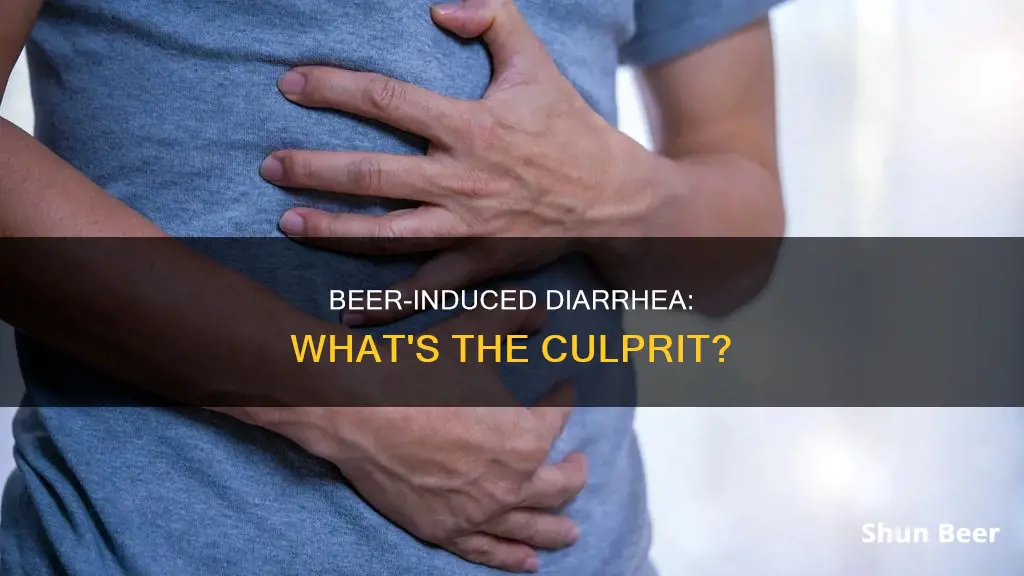
Drinking beer and other alcoholic drinks can cause diarrhea due to the way alcohol affects the digestive system. Alcohol can irritate the stomach lining, leading to inflammation and discomfort throughout the gastrointestinal tract. This inflammatory condition in the stomach is called gastritis. Alcoholic drinks, especially mixed drinks, contain high levels of sugar, which the body struggles to absorb when consumed in excess. This leads to sugar entering the colon, drawing in water, and potentially resulting in loose stools.
Alcohol also alters the balance of beneficial and harmful bacteria in the gut, and an overgrowth of harmful bacteria can interfere with the healthy functioning of the digestive system, leading to diarrhea. Additionally, alcohol acts as a diuretic, causing the body to lose more water than it takes in and leading to dehydration. This can further impact normal water absorption processes in the intestines, resulting in either constipation or diarrhea.
The type of alcohol consumed also plays a role. Beverages with lower alcohol concentration, like beer and wine, speed up gastrointestinal tract activity, increasing the likelihood of diarrhea. These drinks also increase gastric acid secretion, which can irritate the stomach. People may also be allergic or intolerant to certain compounds in wine or beer, such as gluten or certain wine compounds, which can trigger gastrointestinal reactions, including diarrhea.
| Characteristics | Values |
|---|---|
| Alcohol content | Alcoholic drinks with lower alcohol content, such as beer and wine, speed up GI tract activity, increasing the chances of diarrhea. |
| Carbohydrate content | Alcoholic drinks with high carbohydrate content, such as beer, can cause bloating and disrupt the natural motility of the intestines. |
| Sugar content | Alcoholic drinks with high sugar content can lead to an influx of sugar in the digestive tract, causing an increase in fluids and contributing to loose stools. |
| Gut health | Alcohol can irritate the stomach lining, leading to inflammation and discomfort throughout the gastrointestinal tract. |
| Gut bacteria | Alcohol can alter the balance of beneficial and harmful bacteria in the gut, leading to an overgrowth of harmful bacteria and interfering with the healthy functioning of the digestive system. |
| Diuretic effect | Alcohol acts as a diuretic, causing the body to lose more water than it takes in and leading to dehydration. |
| Water absorption | Alcohol can impair the absorption of water in the large intestine, leading to a higher water content in the stool and resulting in diarrhea. |
| Gastric acid secretion | Alcoholic drinks with lower ethanol content, such as beer and wine, increase gastric acid secretion, exacerbating inflammation and diarrhea. |
| Allergens and intolerances | Some individuals may be allergic or intolerant to certain ingredients in alcoholic beverages, such as dairy, gluten, or fructose, which can trigger gastrointestinal reactions, including diarrhea. |
| Gastrointestinal disorders | Individuals with gastrointestinal disorders such as Irritable Bowel Syndrome (IBS), Crohn's disease, or celiac disease are at a higher risk of experiencing diarrhea when consuming alcohol. |
| Sleep patterns | Alcohol consumption can disturb sleep patterns, and irregular sleep can impact digestive health, increasing the risk of gastrointestinal issues. |
What You'll Learn

Alcohol's impact on the gut and its ability to cause inflammation
Alcohol can have a significant impact on gut health, and excessive consumption can lead to various issues, including inflammation. Here are four to six paragraphs detailing alcohol's impact on the gut and its ability to cause inflammation:
Inflammation and Digestion
Alcohol can irritate the gut and disrupt the balance of bacteria in the gut microbiome. This disruption can lead to an overgrowth of harmful bacteria, which can cause inflammation in the digestive tract. The inflammation can lead to enhanced acid production and rapid digestion, resulting in diarrhoea. Alcohol also contains high levels of sugar, which can further contribute to digestive issues and inflammation.
Alcohol's Impact on the Gut Lining
Alcohol can damage the lining of the intestines, causing it to thin and become more permeable. This "leaky gut" allows toxins and bacteria to enter the bloodstream, which can have negative effects on other organs. The mucus layer that protects the intestines becomes thinner and looser due to alcohol consumption, making it easier for toxins to pass through. This can have a detrimental effect on overall health.
Increased Intestinal Permeability
Alcohol and its metabolites can directly damage the epithelial cells in the intestinal barrier, increasing intestinal permeability. This allows pathogens and harmful substances to enter the bloodstream, triggering an inflammatory response in the body. The disruption of the intestinal barrier is caused by oxidative stress and the destabilisation of tight junctions between cells. This increased permeability is linked to the development of inflammatory conditions and organ damage.
Alcohol's Impact on Mucosal Immunity
Alcohol affects intestinal mucosal immunity by decreasing the innate immune response and triggering an inflammatory response in the body. It can lead to an increase in inflammatory immune cells, such as leukocytes and mast cells. Alcohol-related bacterial overgrowth and imbalances in the gut microbiome can also contribute to local and systemic inflammation. Additionally, alcohol suppresses the activity of Paneth cells, which are a crucial line of defence against bacteria in the intestine, further disrupting the intestinal mucosal immune response.
Damage to the Liver
Alcohol consumption can lead to alcoholic fatty liver disease, also known as alcoholic steatohepatitis. The toxins created during alcohol metabolism damage liver cells and promote inflammation. This inflammation can progress to liver failure, liver cancer, or cirrhosis, which are severe conditions that may require a liver transplant. Imbalances in the gut microbiome caused by alcohol consumption can also contribute to liver damage by allowing harmful bacteria to colonise the liver.
Damage to the Pancreas
Heavy alcohol use can also damage the pancreas, which metabolises alcohol into toxic byproducts. These byproducts can damage the pancreatic ducts and cause a painful inflammation called pancreatitis. Alcohol-induced pancreatitis is a severe condition that may require surgery and has long-term complications such as chronic abdominal pain, diabetes, and pancreatic cancer.
Beer and Acyclovir: Is It Safe to Mix?
You may want to see also

The role of diet and food choices when drinking beer
The food you eat while drinking beer can have a significant impact on reducing the chances of experiencing diarrhea. Eating before drinking beer can slow the absorption of alcohol into the body and aid the digestion process. This is because food acts as a "buffer" in the stomach, slowing the rate of alcohol absorption.
- Carbohydrates: Eating carbohydrates before drinking can provide a buffer for the digestive system.
- Bland, binding foods: Foods like bananas, toast, rice, and apples can help produce solid stools.
- Hydrating foods: Include foods that are high in water content, such as cucumbers, watermelon, and oranges, to support hydration and provide essential nutrients.
- Probiotic-rich foods: Consume yogurt, kefir, and fermented vegetables to introduce beneficial bacteria directly into the gut.
- Prebiotic foods: Eat garlic, onions, and asparagus, which serve as food for beneficial bacteria, promoting their growth.
- Fiber-rich foods: While these can speed up digestion, they can also help prevent diarrhea by absorbing water in the large intestine. Examples include bananas, crackers, and toast.
- Bland, low-fiber foods: When experiencing diarrhea, it is recommended to eat bland, low-fiber foods such as bananas, rice, toast, and oatmeal to avoid further irritation.
On the other hand, there are certain food choices that can increase the likelihood of experiencing diarrhea when drinking beer:
- Dairy products: These can be hard to digest and may exacerbate diarrhea symptoms.
- Fatty foods: Fatty foods can irritate the stomach and should be avoided when experiencing diarrhea.
- High-fiber foods: While fiber is important for digestion, consuming too much while experiencing diarrhea can have a laxative effect.
- Caffeine: Caffeine can speed up metabolism and digestion, often leading to loose, watery stools. Therefore, it is recommended to avoid caffeinated beverages, powders, or tablets.
- Sugary and carbohydrate-rich drinks: These can be harder to digest and can increase the chances of experiencing diarrhea.
Mexicans' Favorite Beer: A Cultural Drinking Experience
You may want to see also

How drinking beer affects people with bowel diseases
Drinking beer can affect people with bowel diseases in several ways. Firstly, alcohol can irritate the gut and speed up digestion, leading to diarrhoea. This is particularly common for chronic heavy drinkers, but it can also occur after a single episode of excessive drinking. Beer is also packed with carbohydrates, which are harder to digest and can result in loose stools.
For people with inflammatory bowel diseases (IBD), such as Crohn's disease and ulcerative colitis, alcohol can trigger a flare-up of symptoms, including belly pain and cramping. Alcohol weakens the immune system, increases inflammation, and damages the protective barrier in the gut, all of which contribute to IBD symptoms.
The effect of alcohol on irritable bowel syndrome (IBS) is less clear, but some people with IBS report a worsening of symptoms after drinking. IBS is a condition that affects the large intestine and typically causes cramping, stomach pain, bloating, gas, diarrhoea, and constipation. Alcohol irritates the gut and can lead to a flare-up of these symptoms.
To prevent diarrhoea and other bowel problems after drinking beer, it is recommended to stay hydrated, eat before drinking, and avoid caffeine. For people with bowel diseases, it is essential to understand how the body reacts to alcohol and adjust consumption accordingly. Some individuals with IBS, for example, may need to eliminate alcohol completely, while others can still consume it in moderation without experiencing severe symptoms.
Enjoying Beer at the Beach: What You Need to Know
You may want to see also

The link between alcohol consumption and dehydration
Alcohol is a diuretic, which means it causes the body to remove fluids through the renal system, including the kidneys, ureters, and bladder, at a much faster rate than other liquids. This can lead to dehydration, especially if you don't drink enough water alongside your alcoholic beverage of choice.
When you drink alcohol, your body can absorb it into the bloodstream within minutes, especially if you're drinking on an empty stomach. As it enters your bloodstream, alcohol can travel anywhere in your body, including your brain, which is why you feel drunk.
However, it's important to note that while alcohol can make you pee more, it doesn't necessarily cause dehydration. Research shows that while your first alcoholic drink will make you urinate more than if you had just drunk water, subsequent drinks will not cause any more urine output than if you were drinking water. So, when you spend a night drinking alcohol, you'll only pee just one extra time compared to if you were drinking water.
That being said, it's still important to drink water while consuming alcohol, not to prevent dehydration but to help you pace yourself and support your organs, such as your liver and kidneys, which are working overtime to process the alcohol.
Drinking alcohol can also affect your digestive system, causing issues such as inflammation, harmful bacteria, acid production, increased digestion, and water absorption. This can lead to diarrhea, especially if you have underlying gastrointestinal conditions such as inflammatory bowel disease or irritable bowel syndrome.
To prevent alcohol-induced diarrhea, it's recommended to modify your drinking habits, either by abstaining from alcohol completely or by drinking in moderation. It's also important to drink plenty of water and eat before drinking alcohol to slow the absorption of alcohol into the body and aid digestion.
Ibuprofen and Beer: Safe Mix or Not?
You may want to see also

The impact of alcohol on the body's absorption of water
Alcohol can have a significant impact on gut health and is a known irritant of the gut. It can affect the way the body digests food and can cause diarrhoea.
When alcohol enters the body, it is absorbed into the bloodstream. This process begins in the stomach, where food can act as a "buffer", slowing the rate of alcohol absorption. However, when the stomach is empty, the alcohol continues to the small intestine, where it passes through the intestinal wall at a much faster rate.
Alcohol can cause the muscles of the large intestine to contract more frequently, moving stool out of the body before liquid can be absorbed. This results in diarrhoea. Alcohol can also impair the function of the large intestine and disrupt water absorption, leading to diarrhoea-like symptoms.
Additionally, alcohol can cause inflammation of the digestive system, leading to enhanced acid production and rapid digestion, which can also contribute to diarrhoea. Alcohol is packed with sugar, and when there is an influx of sugar into the digestive tract, the intestines begin to increase the amount of fluid, which can contribute to loose stools.
Furthermore, alcohol can alter the balance of bacteria in the gut, leading to an overgrowth of harmful bacteria that interfere with the healthy functioning of the digestive system and cause diarrhoea.
To prevent alcohol-induced diarrhoea, it is recommended to drink in moderation, stay hydrated, and eat before drinking to slow the absorption of alcohol and aid digestion.
Beer and Rifampin: Safe or Not?
You may want to see also
Frequently asked questions
Beer is packed with carbohydrates that are hard to digest, which means stools may not be fully formed before a bowel movement. Beer also has a lower alcohol concentration, which speeds up GI tract activity and increases the chances of diarrhea.
Drinking beer can cause an allergic reaction to certain compounds in the drink. Beer also contains gluten, which can cause gastrointestinal reactions such as bloating and diarrhea.
It is recommended to drink in moderation and to not drink on an empty stomach. It is also suggested to eat simple foods and hydrate before drinking beer.







